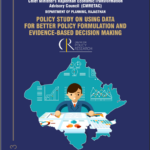
Data Matters: Linking Development Data to Government Performance
15 October 2010
![]()
How come the government gets away with putting out data that is often inconsistent? How come our politicians get away without having to justify their ‘performance’ in any tangible way when they seek re-election?
Let us look at the two worlds — first, the world of government data: The data that government collects is mostly used for administrative reasons — tracking, checks and balances, etc. Most of this data is often locked up in files. There are often large variations in government data on the same parameter when accessed from two different sources within government. The Right to Information is an important tool to get data out, but the bottom line in the government is that there still remains an absence of a culture of openness.
Second, the world of our politicians. Politics anywhere is fiercely competitive. As we have seen over these past few days, it appears to be especially so in Karnataka! But the competition in our politics is a raw quest for power. And we all know there is something fundamentally wrong with this. What if we are able to get politicians to compete on real issues? What if they are forced to refer to facts and figures in specific terms when they reach out to the people for re-election?
The work of IndiaGoverns really focuses on getting tangible data on performance as put out by government to matter to politicians and politics in the country.
As a starting point, we have taken the data from government sources in Karnataka at the local level, and organised it along MLA constituency boundaries. Based on this, we have prepared one page reports on Education Indicators, and have sent it to MLA in the state. (Please see http://www.indiagoverns.org/summaries/ to access the reports.) We have chosen data for education for a year which is even before this set of MLAs was elected in 2008. Our next report on education will be current, and will show the progress during his tenure.
The real challenge for us is to reach such data to citizens, NGOs, local journalists. And even to politicians in the state who have lost elections. Such data should become useful for all stakeholders to take up progress in the constituency using tangible data. And the MLA should defend his record of progress in various sectors during his tenure as MLA. Of course, the MLA can also use such data to ask for more government allocations if his constituency has a poor track record on any development issue. We are working on similar reports for health, water, etc.
We invite your suggestions, but also any concrete steps you can take in helping with dissemination of such information widely.
Veena Ramanna is the Executive Director of the IndiaGoverns Research Institute. You can find out more about the Institute’s work at http://www.indiagoverns.org/.





